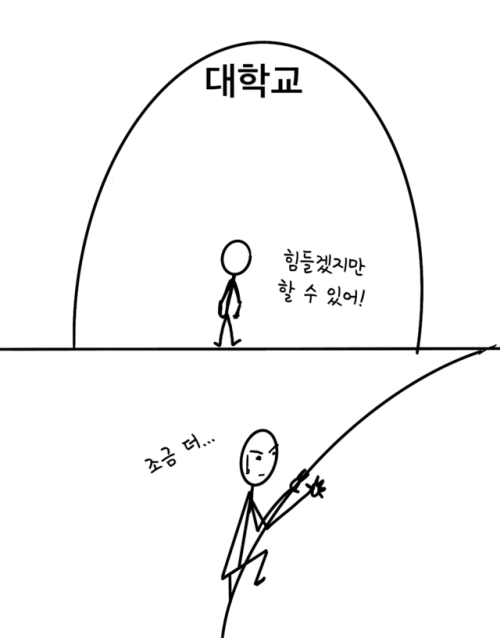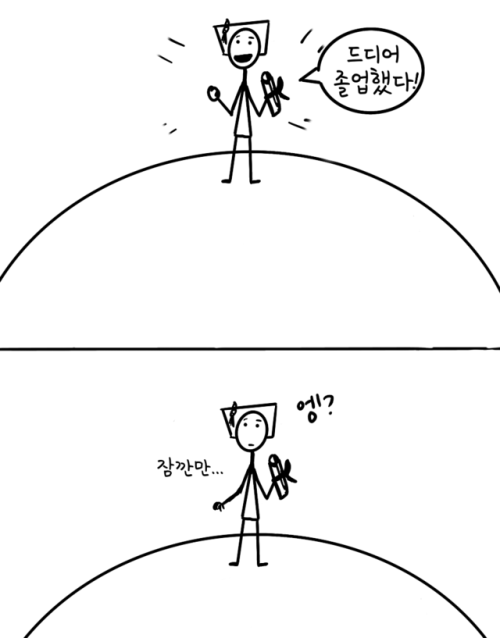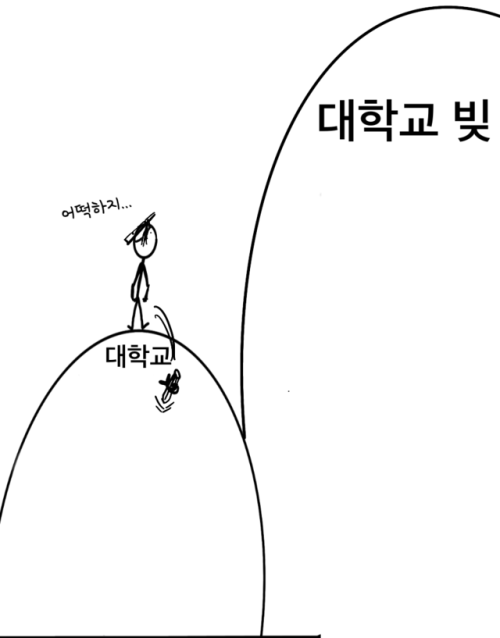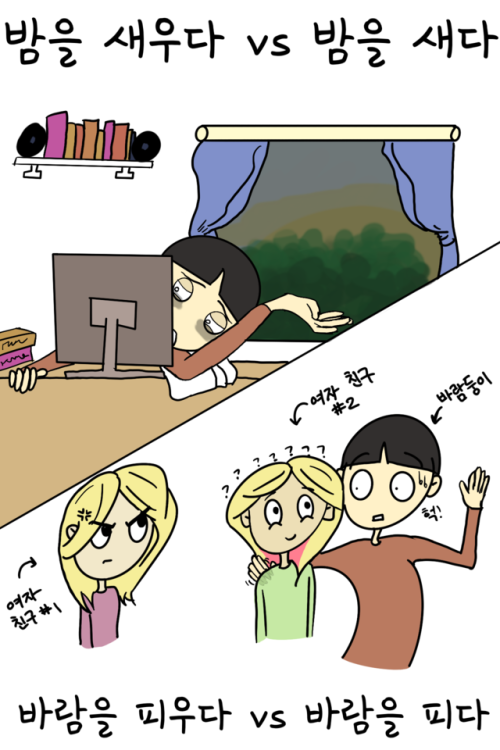#공부
VOCABULARY WORDS #2 (어휘)
Family - 가족
Grandfather - 할아버지
Grandmother - 할머니
Father - 아버지
Mother -어머니
Younger brother - 남동생
Younger sister - 여동생
Son - 아들
Daughter - 딸
Husband - 남편
Wife - 아내
Younger sibling - 동생
(from a male perspective)
Older brother -형
Older sister - 누나
(from a female perspective)
Older brother - 오빠
Older sister - 언니
Interrogative pronouns
Who - 누구
Who - 누가 (누구+가(subject marker))
What - 무슨
Personal pronouns
My - 나의 / 내 /제
Our - 우리
(honorific)
This person - 이분
That person - 그분
That person - 저분
Other helpful vocabulary words:
Company - 회사
To work for / to go to - 다니다
Flower - 꽃
Rose - 장미
Library - 도서관
Morning - 아침
Nurse - 간호사
Counting unit for people - 명
College student - 대학생
To love - 사랑하다
to be right - 맞다
Really - 정말
Photograph - 사진
To be pretty - 예쁘다
To marry - 결혼하다
Last year - 작년
[ActiveKorean2]
Hi, it’s been a long time since I posted here and decided to be active again. As of the moment, I can’t think of any korean related lesson to post. Any suggestions? :)
VERB PER DAY #3
하다 - to do
Past tense - 했어요
- A:어제 뭐 했어요?
- What did you do yesterday?
- B:나의 숙제를 했어요.
- I did my homework.
어제 - yesterday
뭐 - what
나의 - my
숙제 - homework
Present tense - 해요
- A:무슨 일을 해요?
- What work do you do?
- B: 저는 의사예요.
- I am a doctor.
무슨 - what; what type; what kind
일 - work
의사 - doctor
Present progressive - 하고 있어요
- A:뭐 하고 있어요?
- What are you doing?
- B:운동을 하고 있어요.
- I am exercising.
운동 - exercise (noun)
Future tense - 할 거예요
- A:너 왜 이렇게 빨라요?
- Why are you so fast?
- B:제 친구가 기다려서 내가 이거를 그냥 빨리 할 거예요.
- My friend is waiting so I’ll just do this quickly
너 - you
왜 - why
이렇게 - so; in a manner; in a way; like this
빠르다 - to be fast (빨라요 - present tense)
제 - my
친구 - friend
기다리다 - to wait
이거 - this
그냥 - just
VERB PER DAY #2
보다 - to see
Past tense - 보 + -았어요 = 봤어요
- 어제 뭐 했어요?
- What did you do yesterday?
- 친구랑 같이 영화를 봤어요.
- I watched a movie with my friend.
Present tense - 보 + -아요 = 봐요
- 요즘 뭐 해요?
- What do you do these days?
- 영화를 봐요.
- I watch movies.
Present progressive - 보 + -고 있어요 = 보고 있어요
- 지금 뭐 하고 있어요?
- What are you doing now?
- 지금 텔레비전을 보고 있어요.
- I am watching TV now.
Future tense - 보 + -ㄹ 거예요.
- 내일 뭐 할 거에요?
- What will you do tomorrow?
- 내일 공원에서 폭죽을 볼 거예요.
- I will watch fireworks tomorrow at the park.
VERB PER DAY #1
먹다 - to eat
Past tense - 먹었어요
- 저는 어제 피자를 먹었어요.
- I ate pizza yesterday.
Present tense - 먹어요
- 오후 열두 시에 점심을 먹어요.
- I eat lunch at 12 pm.
Present progressive - 먹고 있어요
- 지금 빙수를 먹고 있어요.
- I am eating bingsu now.
Future tense - 먹을 거예요
- 나중에 친구들이랑 냉면을 먹을 거예요.
- I will eat naengmyeon later with my friends.
Today I have another 속담(proverb/old saying). 산 넘어 산이다.
This one is one of my favorites. Life is full of challenges one after another. And this proverb illustrates just that feeling.
So, let’s first break 산 넘어 산이다 down. 산 means mountain(s), 넘다 means to climb over, pass, cross, and 산이다 is 산(mountain) plus the copula 이다 (similar to “to be”).
산 넘어 산이다. Literally means something like “there is (another) mountain after going over a mountain.”/ “Go over the mountain and there is another mountain.”
It’s used to express discontent that there is “one problem/challenge after another.” Once you finish one challenge, another one appears.
So, like the pictures, American college students are in a debt crisis. So, it’s probably pretty relatable for some of you. I just struggled to get through college! So, now I should be okay. But, the moment I finish my first challenge (getting through college), I’m immediately faced with another challenge (paying off college debt).
With life always putting new problems, barriers and challenges in front of us, this is a great expression. Here are some examples.
산 넘어 산이라고 대학교를 졸업하자마자 학비를 갚아야 돼요. “It’s just one challenge after another.” As soon as I graduate, I have to repay my school costs.
인생은 쉽지는 않지. 산 넘어 산이라고 하잖아. Live isn’t easy. They say it’s one hardship after another you know.
A: 민경아, 취직했다면서? 축하해! Mingyeong. I heard you got a job? Congratulations!
B: ㅋㅋ 고마워..취직을 하긴 했는데 다음 주 영어 시험을 봐야 된대. 산 넘어 산이야. haha Thank you…I did get a job, but they said I have to take an English exam next week. It’s just one thing after another.
Let me know if you have any questions. Good luck studying everyone! I hope you don’t have too many mountains to cross while studying Korean!
Post link
Hey guys, today I have two interesting verbs for you.
새우다 and 피우다. The reason they are interesting is that you often don’t see them in their “correct” form while talking. Some of you might have even noticed this or wondered why you don’t see 새우다 and 피우다 often or if there is a difference.
In textbooks you’ll learn sentences like:
어제 밤을 새워서 공부했어요. I stayed up all night studying yesterday.
But, you don’t hear that sentence too often in real life conversations with friends. Instead, you hear this:
어제 밤을 새서 공부했어요. I stayed up all night studying.
Or
밤을 샜어요. I stayed up all night./I pulled an all-nighter.
In class, newspapers, and in the dictionary, you will (or should) find the verb as 새우다. But, most people (at least in Seoul) use the verb as 새다. 우 completely disappears. 피우다 is the same. In the dictionary and in your books, you’ll see 담배(를) 피우다 and 바람(을) 피우다. But, many people say 담배(를) 피다 and 바람(을) 피다.
밤을 새다 is technically incorrect. But, you’ll hear it more often than the correct version. It’s kind of like “who and whom” in the US. Most people don’t use “whom” at all. They use “who” incorrectly even if they know it’s wrong. That’s because for some weird reason using “who” wrong sounds more natural than using “whom” correctly.
Here are a few examples of the three most common words I’ve come across.
담배를 안 폈으면 좋겠어요. (*안 피웠으면) I wish you didn’t smoke cigarettes.
밤을 새지 마. 숙제는 내일 해. (*새우지 마) Don’t stay up all night. Do your homework tomorrow.
남자 친구가 바람을 피면 끝이야! (*바람을 피우면) If (my) boyfriend cheats, it’s over/it’s the end.
It’s strange that language sometimes sounds better when it’s wrong, right? Just one more reason to not stress about speaking “perfect Korean.” You should use the correct form when writing papers and on tests, but when you’re talking or texting, feel free to use it “incorrectly.”
Anyway, good luck studying guys!
Post link
문하생 모집(1명)
호묵원에서 문하생을 찾습니다.
하는일의 기여도에 따라 페이지급을 할 예정이며
문신사의 꿈에 더 수월하게 도달할 수 있는 기회를 가질 1명을 찾습니다.
(수강X)
★<아래 조건중 3개 이상 해당하여야 하며 본원에서 숙식가능>★
1.영어 회화 가능자 (혹은 일어)
2.22세이상 군필 (면제,공익X)
3.몸이 깨끗한 자 (원포인트 조금은 가능)
4.자동차 운전면허 소지자
5.동영상 편집 가능자 우대(페이지급, 필수조건!)
(메일 및 연락처로 문의주시면 검토후 답변드리겠습니다)
연락처 010-9301-3755
E-MAIL:[email protected]
.
#타투 #문하생 #공부 #꿈 #노력 #타투문하생
https://www.instagram.com/p/CC5CoZRjCWR/?igshid=1bckgu5qfv3ct
Post link
Cafe Drink Vocabulary
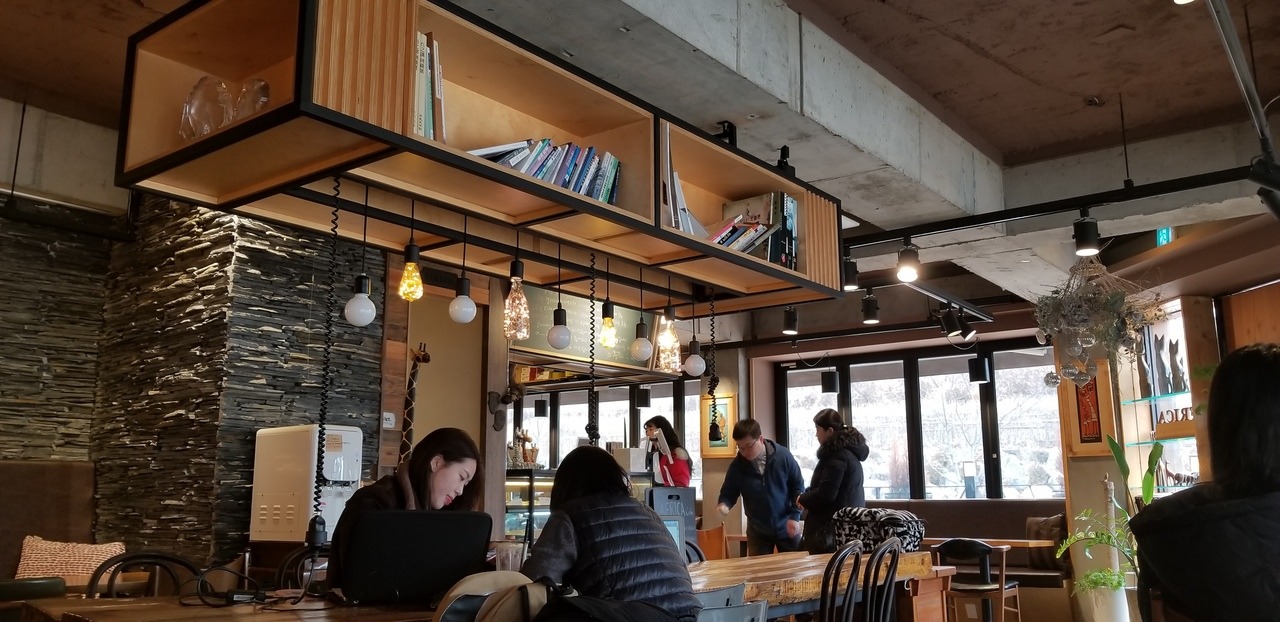
Cafes usually break their menu down by sections:
1) 커피/에스프레소 Coffee/Espresso
아메리카노 | americano
에스프레소 | espresso
카페라떼 | cafe latte
카푸치노 | cappucino
카라멜마끼아또 | caramel macchiato
바닐라라떼 | vanilla latte
카페모카 | caffe mocha
화이트모카 | white mocha
2) 라떼 | Lattes
These are ones that (usually) don’t have coffee in them. Always better to ask.
군고구마라떼 | sweet potato latte (tan/slightly green color)
자색고구마라떼 | purple sweet potato latte
그린티/녹차라떼 | green tea latte
초코라떼 | hot chocolate
블루베리라떼 | blueberry latte
3) 아이스/에이드 | Iced/Ade
This category is usually iced teas, specialty iced drinks, and “ades.” The lemonades and other drinks are usually more of the non-American style where they’re fizzy instead of made with water, sugar, and juice of the fruit.
레몬에이드 | lemonade
오렌지에이드 | orange
자몽에이드 | grapefruit
딸기에이드 | strawberry
청포도에이드 | green grape
블루베리에이드 | blueberry
아이스티 복숭아 | iced peach tea
아이스티 레몬 | iced lemon tea
4) 쥬스/스무디 | Juice/Smoothie
These are the most common flavors. There’s often a combination of them below. And if theres more than one flavor, they’re often like this 딸기바나나 요거트 스무디.
생과일 | fresh fruit (생 before a fruit name means its fresh)
망고 | mango
딸기 | strawberry
바나나 | banana
키위 | kiwi
파인애플 | pineapple
블루베리 | blueberry
수박 | watermelon
요거트 | yogurt
5) 차 | Tea
녹차 | green tea
홍차 | black tea
유자차 | citron tea
자몽차 | grapefruit tea
장미차 | rose tea
캐모마일 | chamomile
페퍼민트 | peppermint
쟈스민 | jasmine
로즈마리 | rosemary
(꿀)레몬차 | (honey) lemon tea
오미자차 | five (flavor/fruit?) tea
인삼차 | ginseng tea
국화차 | chrysanthemum tea
보리차 | barley tea
vocab
- 안녕하세요 hi, hello, how are you good afternoon etc.
- 감사합니다 thank you
- 네 yes
- 아니요 no
- 커피 coffee
- 네, 맞아요 yes, that’s right
- 화가 painter, artist
- 게임 game
- 골프 golf
- 시간 time
- 재미 fun
- 내일 tomorrow
- 병 illness, disease
- 미래 future
- 가다 to go
- 먹다 to eat
- 살다 to live
- 안녕히 가세요 bye (others are leaving)
- 안녕히 계세요 bye (you’re leaving)
- 하다 to do
- 않다 to not do (smt), to not be (adj)
- 아니다 to not be (smt)
- 있다 to be, have, exist
- 없다 to not be, not have, not exist
grammar
- yes and no are different from english’s yes and no. you say 네 if you agree, eg. in english if you were asked don’t you like coffee you would say no, i don’t coffee, but in korean bc the statement i true you would say 네, 커피 안 좋아요
- how to use 있다 and 없다. 물 있어요 (there is water) and 물 없어요 (there isn’t water)
- by raising tone at end you can make it a question, 물 있어요?
- present tense, 아/어/여 + 요. if the verb stem’s last vowel is ㅏ or ㅗ it is followed by 아요, 가다 (to go) -> 가요 (i go). if the last vowel is not ㅏor ㅗ it is followed by 어요, 먹다 (to eat) -> 먹어요 (i eat). the stem 하 is followed by 여요 which becomes 해요 (i do).
- note 가요 can mean i go, you go, he eats etc.
random
- i watched a little KINDA COOL 아영, i find her videos are so relaxing
- i went through some pronunciation rules & exercises
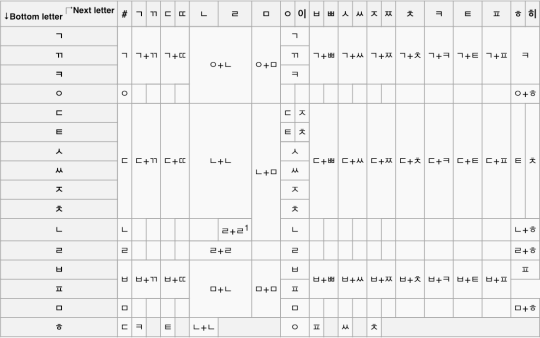
here is also a chart i found that helped me so much! is shows how to pronounce a word depending on the bottom letter and the next letter (# means nothing; basically how to pronounce when it’s the last letter). eg.
공룡 is pronounced 공뇽 (dinosaur).

this one was quite simple. so as u might seen i’m back and i restarted my journey :) bc of that i might be able to go a little faster through it bc it’s kind of just repetition but i still want to go through them just to get the basics for sure right. hope u understand!
It’s quite difficult to explain but you use V게 내버려 두다 as said on the title: to leave a person do V/ to leave a person and let them do V (btw this is commonly used).
Take a look at the examples below to get a better understanding of the grammar point:
나 좀 그냥 혼자 있게 내버려 둬! (나 좀 그냥 혼자 있게 놔둬 요!)
Just leave me alone!
울게 내버려두다 (울게 놔둬 요 )
To leave a person alone and let them cry
남을 제멋대로 하게 내버려 두다 ( 남을 제멋대로 하게 놔둬 요 )
Leave a person to do as they like
일이 되어가는 대로 내버려 두다 (일이 되어가는 대로 놔둬 요 )
Leave the matter as it is
일이 흘러가는 대로 내버려두다 ( 일이 흘러가는 대로 놔둬 요 )
To let things slide
날 좀 살게 내버려 둬줘! ( 날 좀 살게 놔둬줘 요 !)
Just let me live!
제멋대로 살게 내버려 두다 ( 제멋대로 살게 놔둬요)
To let a person live as they like/ To leave a person and let them live as they like
-구아영 & 강태빈

